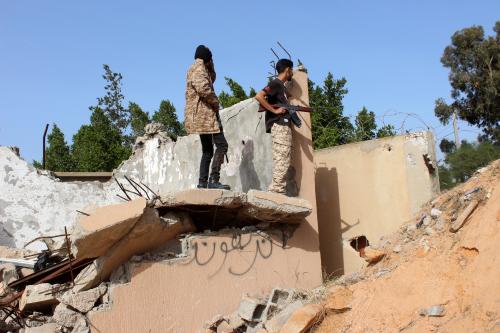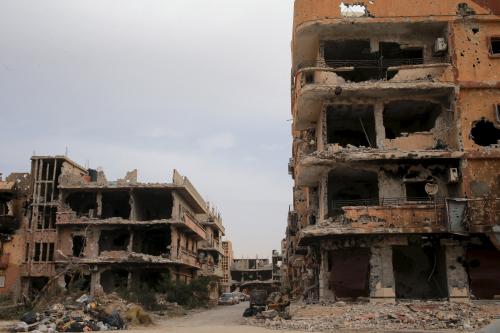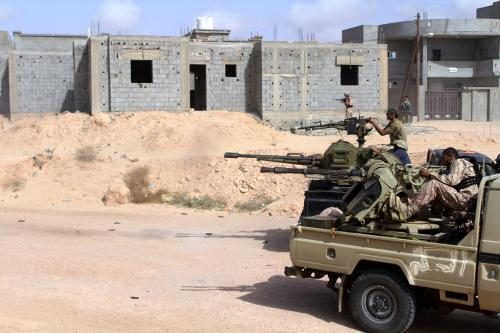History repeats itself, it is often said. The strife facing modern-day Libya—strife largely born of and fueled by internal, sometimes tribal divisions—is only the latest iteration in a longstanding pattern. As the Italians discovered during their colonization of Libya, and as ISIS discovered when it conquered Sirte, and as the international community has recently discovered in a multitude of ways, Libya is a deeply divided country. Without a real approach to that reality—including perhaps creating a confederal model for Libya—Libyans themselves will continue to be their own worst enemies.
Then
Libya’s tribal divisions were long a reality for the Italians, who occupied the North African country from 1912, after winning it from Turkey, to 1943, when they lost it against the British. Italy also used those divisions to its advantage in early 1928, when it defeated the rebellious tribes of Mogharba and many others—who were engaged in fight against the Italian Royal Army but also, and above all, against each other. The Italians occupied the Corridoio Sirtico (Sirtic Corridor), an ideal break line, and conquered the oases of Al-Jufrah, Zellah, Awjilah, and Gialo, isolated in the Cyrenaic desert more than 150 miles from the Mediterranean Sea. Shortly afterwards, three gruppi mobili (mobile groups), formed by thousands of Italian soldiers, moved in from Tripolitania and Cyrenaica in a pincer movement. The target: the rebels in the Sirtic Corridor, who also fell.
These developments allowed the unification of the two colonies, Tripolitania and Cyrenaica, under the leadership of Marshal Pietro Badoglio. This was a major shift: Until that point, Libya had two political governments, two military commands, and two different administrations.
The Italians had faced a formidable set of foes, and made the right call in marshaling the massive use of all available troops on the ground and in the air, immediately and completely disarming the population and, in the end, transitioning Libya’s government from a military to a political one.
There’s a critical history lesson here, for the Libyans and for foreign powers that seek to have influence there: When Italians tried to unify the two regions, already profoundly divided, they faced an extremely motivated enemy, with superb fighters and fine experts of the terrain who were supported by the people. That enemy had everything to win, but lacked one thing: unity.
Today, as in 1928, the willingness to put aside their own individualism for the higher good of the nation seems to be missing.
Now
Long after the Italians left and Libya gained its independence, Sirte remained a strategic point for the country. It was the hometown of longtime Libyan leader Moammar Gadhafi and the birthplace of the African Union in 1999. To this day, Sirte is still the key line of contact between Libya’s two main regions.
And one year ago, ISIS took control of the city. Various Libyan militias—about 70 percent of which have come from Misrata, the rest from all over Libya—have fought to free it since then. The battle has been much more than a battle—rather, in the streets of Sirte, Libyans are deciding the alliances that will determine the fate of their country. Historically opposed militias are now allied and vice versa, while ISIS loses ground and withdraws into the dunes of the desert, planning much more fluid strategies.
Libyans are winning the battle, not the war. In Libya today, the main threat is not ISIS. It has never been. In Libya, the real problem are Libyans, fraught with internal divisions, just like a century ago. Many tend to perceive the foreign presence—even if decisive for victory, as in this case—as a threat rather than as a true alliance. Prime Minister Fayez al-Serraj and Mohammed al-Ghasry (commander of the operation al-Bunyan al-Marsous) officially requested Western participation in the anti-ISIS fight. But that presence, which has been so decisive in military terms, could be counterproductive politically.
It’s striking, in fact, that two bitter enemies—General Khalifa Haftar (the “strongman” of Tobruk, supported by the Russians and French) and Sadiq al-Ghariani (the Grand Mufti of Libya, who lives in Tripoli)—have agreed in condemning the U.S. intervention and, more typically, Serraj’s weakness. The latter is another problem: Serraj was chosen for being a moderate, but this is likely to be his undoing at a time when political charisma could make a difference. To make things worse, the special envoy for United Nations Support Mission in Libya, Martin Kobler, declared last week that support for the Government of National Accord (GNA) is “crumbling” amid increased power problems and the quick fall of Libya’s currency.
The other hot topic, as always, is the integration of General Haftar and his National Army into the GNA. But at the moment—thanks to dangerous and opaque foreign support, including particularly from Russia—he does not seem willing to give anything to the GNA. After two years of civil war, nothing has changed, and this is a clear symptom of a much larger disease: a national conflict rooted in local and atavistic fights. Gadhafi no doubt had many faults, but so do the Libyans. Libyans today have much in common with the tribes of one century ago, with both in constant struggle with each other for pastures and land dominance. Above all, the result is the same: Libyans are fighting each other at a local, regional, and national level. Today, as in 1928, the willingness to put aside their own individualism for the higher good of the nation seems to be missing.
In the 1920s, the Italians won in Libya because they made right moves military and politically. True. But, above all, they won against the Libyans because of their divisions. “Divide et Impera,” said the ancient Romans—the Italian Royal Army did it right, partly because Libyans already divided themselves. A century has passed since then. The Italians are gone, Gadhafi was killed, and ISIS seems to be on a similar path. And yet, once again, the true enemy of Libya seems to be always the same: Libya. Libyans will continue to be their own worst enemies—unless they, in partnership with the international community, can figure out a political model that benefits from their diversity rather than trying to override it.
The Brookings Institution is committed to quality, independence, and impact.
We are supported by a diverse array of funders. In line with our values and policies, each Brookings publication represents the sole views of its author(s).








Commentary
A house divided: Why partitioning Libya might be the only way to save it
August 18, 2016